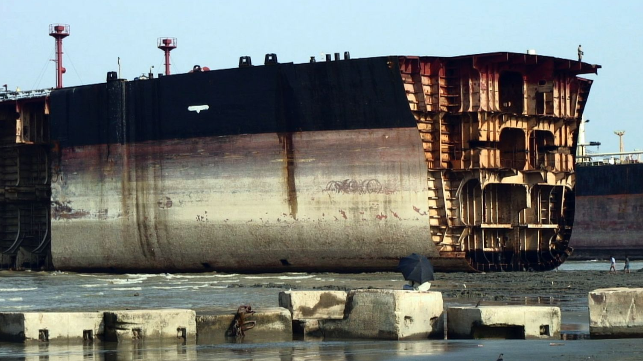GMS Responds to Norges Bank Exclusions

Last week, Norway's sovereign wealth fund, the largest in the world at a valuation of $1 trillion, announced its decision to exclude four shipping firms from its portfolio over their shipbreaking practices. All will be excluded from the influential fund for a period of at least four years.
Norges Bank has excluded Evergreen Marine Corp (Taiwan), Korea Line Corp, Precious Shipping PCL and Thoresen Thai Agencies, the parent company of Thoresen Shipping. It has also placed Pan Ocean Co. under observation for the same risks.
Cash buy GMS has responded to the news saying:
We have seen with great interest the recent announcement made by Norges Bank and the Council of Ethics of the Norwegian Government Pension Fund Global, on their decision to exclude a list of shipping companies from investment by their Fund. They arrived at this decision because the companies had chosen to recycle some of their vessels with the method of beaching in Bangladesh and Pakistan, and therefore citing a "risk of severe environmental damage and serious or systematic violations of human rights."
On one hand, the decision of the Bank and of the Council of Ethics appears to target the recycling method of beaching, but on the other hand, they do not blacklist ship recycling by beaching in India. Therefore, they appear to be aware of the important improvements that have taken place in India and of the fact that half of the yards there have already obtained a Statement of Compliance (SOC) with the Hong Kong Convention for the Safe and Environmentally Sound Recycling of Ships (HKC) from IACS class societies. Thus, we conclude that the Bank and the Council of Ethics have correctly recognized that poor standards are NOT linked with beaching.
The Bank also admits that the Executive Board in reaching its recommendations “has not carried an independent assessment of all aspects.” It is clearly evident that they were not aware of the improvements that are taking place in Bangladesh, some of which funded with the continuing support of the Norwegian government (i.e. the SENSREC project with IMO). How can a sovereign fund of this magnitude make decisions based on allegations, without the conduct of an independent assessment, is an extraordinary action that ought to raise questions in the public mind.
Furthermore, the Bank and the Council of Ethics claim that working conditions in Bangladesh and Pakistan are extremely poor and that the ship recycling process causes severe environmental damage. In saying this they fail to recognize the change that is taking place and the substantial improvements that have taken place, starting with the first yard in Bangladesh to have gained a Statement of Compliance with HKC.
Dr. Nikos Mikelis, Non-Executive Director, GMS comments: “In ignoring the investments and improvements of yards such as PHP, the Council of Ethics is failing its name because it is discouraging improvements and investments by other yards in these countries, self-fulfilling in this way their accusations of poor working and environmental conditions in the whole of these countries.
“What would make sense instead, will be for the Norwegian Fund and its Council of Ethics to recognize and accept all yards that have attained compliance with HKC, regardless of where they are located. This will motivate improvements to the whole of the ship recycling sector, and that is the right and only way to move forward, if we really wish to see progress in the ship recycling industry."
The opinions expressed herein are the author's and not necessarily those of The Maritime Executive.
